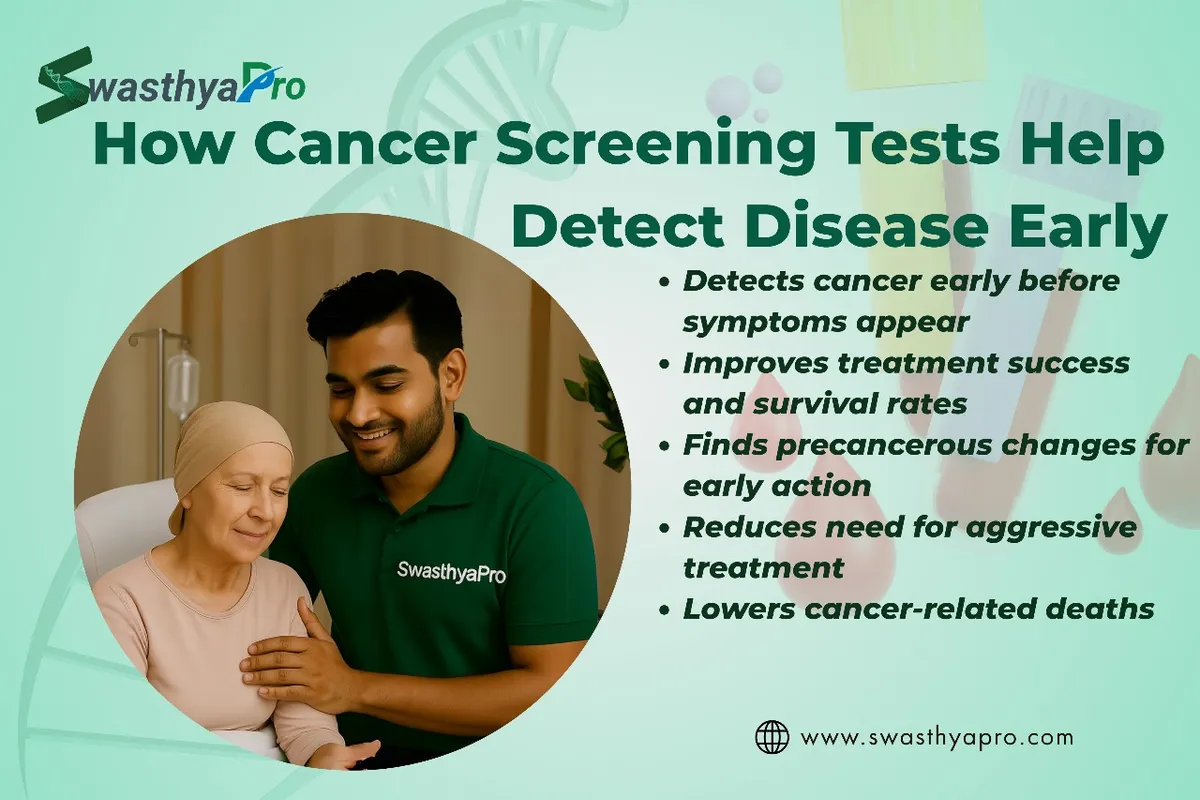Cancer screening test after 40: Why Timing Is Everything

Turning 40 is a milestone — a moment when many people start focusing more seriously on health, lifestyle, and longevity. While you may still feel young and active, your body begins to change silently in your 40s. This is exactly why getting a cancer screening test after 40 becomes not just helpful, but crucial.
Cancer is one of the few diseases where early detection significantly improves the chance of survival. And many of the most common cancers begin to develop in this age group — long before symptoms appear. A simple cancer screening test can catch these invisible threats early, giving you the upper hand.
Let’s explore why the age of 40 is the perfect time to start screening, which tests to consider, and how this one decision could save your life.
Why Age 40 Is a Key Turning Point
Up until your 30s, most standard health checks focus on lifestyle-related risks — like blood pressure, sugar, cholesterol, and vitamin deficiencies. But after 40, the risk of cancer starts to rise sharply, especially for the most common types:
- Breast cancer
- Prostate cancer
- Cervical cancer
- Colorectal (colon) cancer
- Oral and lung cancer (especially in smokers)
A cancer screening test at this stage can pick up early signs of these diseases — often years before they become dangerous.
What Makes a cancer screening test So Valuable After 40?
1. Silent Growth of Disease
Most cancers grow quietly. By the time pain or symptoms show, they may already be in advanced stages. A cancer screening test can detect tiny changes in cells, blood, or tissues before they create real damage.
2. Higher Risk from Lifestyle Accumulation
By 40, years of stress, poor diet, sedentary habits, or substance use may begin to show their impact. Screening helps catch the long-term effects of these choices early.
3. Family History Comes Into Play
If any family members had cancer in their 40s or 50s, your chances go up. A regular cancer screening test becomes your first line of defense.
Which cancer screening test Should You Take After 40?
Here’s a breakdown by gender and risk:
For Women:
- Mammogram:
- Starts at age 40
- Checks for early-stage breast cancer
- Every 1–2 years
- Pap Smear + HPV Test:
- Continues from your 20s
- Checks for cervical cancer
- Every 3–5 years
- Thyroid and CA-125 (if family history of ovarian cancer):
- Optional, based on symptoms or genetics
- Oral Exam (especially for smokers):
- Every year
For Men:
- PSA Blood Test:
- Starts at age 45–50
- Screens for prostate cancer
- Every 1–2 years
- Colonoscopy or Stool Test (FIT):
- Starts at age 45
- Screens for colon cancer
- Colonoscopy every 10 years or stool test yearly
- Oral Cancer Exam:
- Essential if tobacco or alcohol is used
- Low-dose CT scan (for smokers):
- Annual, if you're over 50 with smoking history
These tests are the backbone of any solid cancer screening test plan post-40.
What If You Feel Perfectly Fine?
That’s exactly why you need a cancer screening test.
Early-stage cancers are often asymptomatic — no pain, no signs, no warning. Screening is not about reacting to illness; it's about staying ahead of it.
Just like servicing a car before it breaks down, your body needs timely checks to prevent high-cost repairs later.
How to Get Started
You can now easily book your cancer screening test online from trusted labs like:
- Tata 1mg
- Redcliffe Labs
- Healthians
- Apollo Diagnostics
- Thyrocare
Most offer:
- Home sample collection
- Online reports within 24–72 hours
- Doctor consultations included
- Combo health + cancer screening test packages starting from ₹999
Just select your age, gender, and risk profile — and you're good to go.
How Often Should You Get Screened After 40?
- Mammograms & PSA: Every 1–2 years
- Pap/HPV Tests: Every 3–5 years
- Colon Screening: Stool test every year or colonoscopy every 10 years
- Oral & Skin Checks: Annually
If you have a family history of cancer, your doctor may advise more frequent cancer screening test intervals.
Final Thoughts
Your 40s are a decade of balance — you may feel unstoppable, but your body is changing beneath the surface. A cancer screening test isn’t about fear. It’s about facts, foresight, and taking responsibility for your future.
The earlier you start, the more control you gain.
So don’t wait for a reason. Let your reason be prevention. Let your action be timely. And let your 40s mark not just growth, but guarded health.
Because when it comes to cancer, timing isn’t just important — it’s everything.